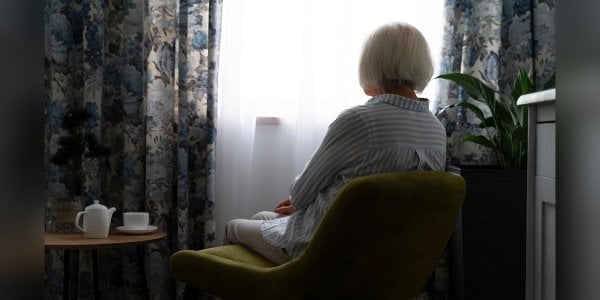Loneliness and isolation could lead to brain shrinkage, study finds
By
VanessaC
- Replies 5
Did you know that your social life could be affecting your brain’s health?
A recent large study discovered that older adults who are more isolated are highly susceptible to brain shrinkage–especially in parts of the brain related to dementia–than those who can socialise more frequently.
‘Social isolation is a growing problem for older adults,’ said Toshiharu Ninomiya, MD, PhD, of Kyushu University in Fukuoka, Japan, author of the study.
‘These results suggest that providing support for people to help them start and maintain their connections to others may be beneficial for preventing brain atrophy and the development of dementia.’
The study, which was published in Neurology, involved a sample of 9,000 Japanese adults without dementia aged 65 years and older, 57 per cent of which were women with an average age of 73. All participants received a comprehensive health examination and were subjected to MRI scans.
The researchers asked each participant how often they interact with others through the question: ‘How often are you in contact with relatives or friends who do not live with you (e.g., meeting or talking with them on the phone)?’
The answer choices were every day, several times a week, several times a month, or seldom.
Results showed that those with fewer social connections and interactions had lower volumes in key brain areas related to memory and dementia, such as the hippocampus and amygdala.
The researchers also found that white matter lesion volume increased significantly in the group with the least social contact–0.30 per cent in the lowest frequency group versus 0.26 per cent in the highest frequency group.
White matter lesions have been linked to cognitive impairment, dementia, depression, and stroke in a previous study.
Does Depression Contribute to a ‘Vicious Cycle’ of Isolation?
The study also found that depression partly explained the relationship between social isolation and brain health, though this accounted for only 15 to 29 per cent of the association.
Howard Fillit, MD, Co-Founder and Chief Scientific Officer for the Alzheimer’s Drug Discovery Foundation, also emphasized that a downward spiral when it comes to isolation may occur due to depression.
‘People who are socially isolated may become depressed, and the onset of Alzheimer's disease is associated with depression 30 to 40 per cent of the time,’ said Dr Fillit, who was not involved in the study.
‘Cognitive decline then can lead to more isolation and depression. It’s a vicious cycle.’
Can Loneliness Cause Physical Damage?
Isolation is known to cause health damage that goes well beyond the brain. The US-based National Council on Ageing warned about the implications of loneliness as it may contribute to the risk of high blood pressure, obesity, a weakened immune system, heart disease, anxiety, and even death.
Research has also shown that loneliness may contribute to inflammation and oxidative stress, which in turn affects blood vessels.
Despite the findings, the authors emphasised that the study does not prove that social isolation directly causes brain shrinkage, but only shows an association.
Another limitation pointed out by the authors is that data is only limited to older Japanese people, so results may not be generalizable to people of other age groups and ethnicities.
‘While this study is a snapshot in time and does not determine that social isolation causes brain atrophy, some studies have shown that exposing older people to socially stimulating groups stopped or even reversed declines in brain volume and improved thinking and memory skills,’ said Ninomiya.
‘So it’s possible that interventions to improve people’s social isolation could prevent brain volume loss and the dementia that often follows,’ he added.
How Can We Maintain Our Brains?
‘We see up to 40 per cent of older adults experiencing social isolation,’ says Dr Mirnova Ceide, who also did not contribute to the research.
‘Essentially, when you're socially isolated, you’re not stimulating your brain, and as with any kind of organism, it needs stimulation. We see the brain acting differently when you’re not getting that stimulation that you normally would from interacting with people regularly. It’s a “use it or lose it” situation.’
Furthermore, Dr Ceide, Associate Professor of Geriatric Psychiatry at the Montefiore Center for the Aging Brain in New York, suggests reaching out to a local senior centre, as they usually have contact information for services for older adults that organise group events, outings, and classes. Other activities recommended by the National Institute on Ageing include:
‘It's really great to find groups of people who have similar interests because it helps to increase the likelihood that you'll make a connection with somebody that's reciprocal,’ he said.

Sharing is caring, dear members! How do you connect and socialise with others? Share your tips in the comments below!
A recent large study discovered that older adults who are more isolated are highly susceptible to brain shrinkage–especially in parts of the brain related to dementia–than those who can socialise more frequently.
‘Social isolation is a growing problem for older adults,’ said Toshiharu Ninomiya, MD, PhD, of Kyushu University in Fukuoka, Japan, author of the study.
‘These results suggest that providing support for people to help them start and maintain their connections to others may be beneficial for preventing brain atrophy and the development of dementia.’
The study, which was published in Neurology, involved a sample of 9,000 Japanese adults without dementia aged 65 years and older, 57 per cent of which were women with an average age of 73. All participants received a comprehensive health examination and were subjected to MRI scans.
The researchers asked each participant how often they interact with others through the question: ‘How often are you in contact with relatives or friends who do not live with you (e.g., meeting or talking with them on the phone)?’
The answer choices were every day, several times a week, several times a month, or seldom.
Results showed that those with fewer social connections and interactions had lower volumes in key brain areas related to memory and dementia, such as the hippocampus and amygdala.
The researchers also found that white matter lesion volume increased significantly in the group with the least social contact–0.30 per cent in the lowest frequency group versus 0.26 per cent in the highest frequency group.
White matter lesions have been linked to cognitive impairment, dementia, depression, and stroke in a previous study.
Does Depression Contribute to a ‘Vicious Cycle’ of Isolation?
The study also found that depression partly explained the relationship between social isolation and brain health, though this accounted for only 15 to 29 per cent of the association.
Howard Fillit, MD, Co-Founder and Chief Scientific Officer for the Alzheimer’s Drug Discovery Foundation, also emphasized that a downward spiral when it comes to isolation may occur due to depression.
‘People who are socially isolated may become depressed, and the onset of Alzheimer's disease is associated with depression 30 to 40 per cent of the time,’ said Dr Fillit, who was not involved in the study.
‘Cognitive decline then can lead to more isolation and depression. It’s a vicious cycle.’
Can Loneliness Cause Physical Damage?
Isolation is known to cause health damage that goes well beyond the brain. The US-based National Council on Ageing warned about the implications of loneliness as it may contribute to the risk of high blood pressure, obesity, a weakened immune system, heart disease, anxiety, and even death.
Research has also shown that loneliness may contribute to inflammation and oxidative stress, which in turn affects blood vessels.
Despite the findings, the authors emphasised that the study does not prove that social isolation directly causes brain shrinkage, but only shows an association.
Another limitation pointed out by the authors is that data is only limited to older Japanese people, so results may not be generalizable to people of other age groups and ethnicities.
‘While this study is a snapshot in time and does not determine that social isolation causes brain atrophy, some studies have shown that exposing older people to socially stimulating groups stopped or even reversed declines in brain volume and improved thinking and memory skills,’ said Ninomiya.
‘So it’s possible that interventions to improve people’s social isolation could prevent brain volume loss and the dementia that often follows,’ he added.
How Can We Maintain Our Brains?
‘We see up to 40 per cent of older adults experiencing social isolation,’ says Dr Mirnova Ceide, who also did not contribute to the research.
‘Essentially, when you're socially isolated, you’re not stimulating your brain, and as with any kind of organism, it needs stimulation. We see the brain acting differently when you’re not getting that stimulation that you normally would from interacting with people regularly. It’s a “use it or lose it” situation.’
Furthermore, Dr Ceide, Associate Professor of Geriatric Psychiatry at the Montefiore Center for the Aging Brain in New York, suggests reaching out to a local senior centre, as they usually have contact information for services for older adults that organise group events, outings, and classes. Other activities recommended by the National Institute on Ageing include:
- Playing cards
- Trying new restaurants
- Travelling in groups
- Video chatting with friends and family
- Taking up a group hobby such as painting, knitting, and birdwatching
- And reconnecting with old high school or college friends through your alumni association
‘It's really great to find groups of people who have similar interests because it helps to increase the likelihood that you'll make a connection with somebody that's reciprocal,’ he said.
Key Takeaways
- A study conducted on about 9,000 Japanese adults aged 65 and older suggests that those who are more isolated face a higher risk of brain shrinkage in areas related to dementia, as opposed to those with more frequent social interactions.
- The study revealed that those with fewer social interactions had lower volumes in the hippocampus and amygdala areas of the brain, which are responsible for memory and are affected by dementia.
- The investigators found that symptoms of depression partially explained the connection between social isolation and brain volumes, signalling a possible 'vicious cycle' of isolation leading to depression and cognitive decline.
- The authors of the study indicated that being proactive about developing and maintaining social connections may be beneficial for brain health–activities like group hobbies, video chats, group travel, and reaching out to senior centres and organisations are encouraged for older adults to help lessen feelings of loneliness and isolation.









